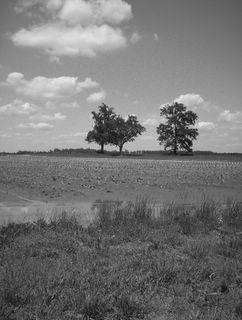I recently felt compelled to learn music history. I don't know why. I was just moved to do so. The resources at the local library were limited to books written before the 1970s, so I chose a tome written by a Frenchman in the 60s called
40,000 Years of Music. Mssr. Chailley, the author, is an expert and proud of the fact, and so, to a woman who can't tell a tetrachord from a tetrazinni, much of the book is unintelligible. But, the parts not written in Latin, are fascinating. And so I skim and glean.
Up to a point, music has no history. It has existed, of course, for 40,000 years, as evidenced by cave paintings in France that depict a bow harp still used in Africa today. But, music, the strains of music, the notes that tickle the air and then disappear, well, they disappear. And, though, surely, there are some strains that have survived through tradition, none of those first notes can be recaptured with any certainty. No one recorded them for posterity.
Art leaves traces on limestone cave walls, on clay pottery shards, on papyrus scrolls. Literature leaves traces in many of the same places. There are clues about music's history hidden within these texts, in the form of stick figure homosapiens plucking at bow harps or Greek courtesans strumming lyres, but the tune itself can never be heard. It has been lost forever.
Even musicians are unknown. Until the troubadors of the Middle Ages, musicians were not stars as we know them today. A mother sang to her child to lull him to sleep. A lover sang to his sweetheart to stir her love. Hunters sang to prey to instill fear and panic. Musicians were people going about their daily lives, but answering the rhythm found naturally in their pulses and breath with audible replies.
The troubadors wrote romantic autobiographies to accompany their songs. Somehow, hearing a love song sung by a man who had been dashed on the rocks of unrequited love made the song sweeter. Hearing a song of adventure from a man who had been imprisoned by a sultan during the Crusades made the song more exhilirating.
But still, there was no history of music. There was the beginning. There were these little thumbnail portraits of musicians, fictional and spectacular as they may be. But music from the past was forgotten as soon as it was heard. Gone forever.
I read and thought in bed last night, and I was again reminded of Pacheco and the line: the wind is the sound the world makes when a moment dies. And how appropriate that music should accompany us and move us and light memories in our minds like paper lanterns. Only something as ineffable and ethereal and transient as music can capture those same qualities of our lives.
And can there be anymore a history of the individual, her brushstrokes, her musical strains, her moments, than there can be of a prehistoric song?







